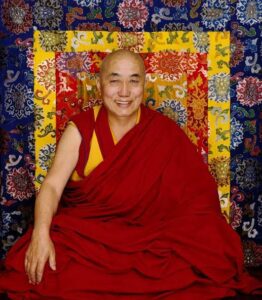| This interview was first published in Yaktail, a magazine published at Chenrezig Institute, Queensland, Australia in 1977 by Ven. Loden Nyingje (Martin Willson) and Andreas Halm. The interview with Geshe Acharya Thubten Loden was conducted by Andreas Halm and translated by Zasep Tulku at Chenrezig Institute, on June 13, 1977. To learn more about Geshe Thubten Loden (1924 to 2011), please visit the Tibetan Buddhist Society. |
 Question: Is there anything for western Dharma practitioners that is especially problematic in the study of Dharma compared to eastern practitioners; Tibetan, Nepali or Indian students?
Question: Is there anything for western Dharma practitioners that is especially problematic in the study of Dharma compared to eastern practitioners; Tibetan, Nepali or Indian students?
Answer: Yes, there are some difficulties because of the different cultures, different religions, and different practices coming from the east. So in the beginning they also have problems. They have to learn traditions, the practice, meditation; and also the relationship between master and student; and how to use the method and how to practice and how to balance. So in the beginning they have some problems. And then after two or three years then they have no problems. Also, there is one problem coming from the west: the external, the material, is too over developed. So the western people, especially the young people, they can do everything because they have so much material possessions. And then they think that when they practice Dharma or meditate the result, the realization, is coming very quickly, automatically. It’s like machinery or something.
They also have some kind of confusion in the mind, complex mind, because there are so many different teachings around the world. They know all the different practices and teachings through friends, through the newspapers, and through other masters. They know so many things, so it is a little bit confusing and they have problems because of this.
Question: What is the essence of Buddhism? What is the very core of it? What is the most important thing one would tell to someone who doesn’t know anything about Buddhism?
Answer: The essence of the Lord Buddha’s teaching, the essence of Buddhism is what we call the three principal paths: renunciation, bodhicitta and wisdom. They are the actions of the Lord Buddha’s teachings, and especially the bodhicitta -loving kindness and great compassion – is essence of the Buddha’s teachings. That is the essence of the teachings.
Question: How can a westerner achieve a renounced mind when he/she is living in such a materialistic society? How can we achieve renunciation?
Answer: You do not have to renounce everything, you know! Renunciation means when we renounce samsaric high pleasures, high enjoyments, in our mind. So, when we renounce it is when we realize that the nature of samsara is dissatisfaction, and no matter how much material possessions we have it is still never enough; we will never receive permanent happiness this way. When we realize that all the material possessions and samsara is in the nature of dissatisfaction, when we realize, then we have no more grasping, no more grasping and then we have a satisfied mind; then that person has received, achieved renunciation.
And so, for instance, before, the great Indian kings, they have very high possessions, very, very, very rich and they have no attachment to their possessions, because they understood Dharma and practiced continuously. They accumulated material possessions because of their past karma, but they believe the material possessions, all the expensive and precious things, are just like a piece of grass, a piece of wood, a piece of stone. So like that. Then when a person who has that kind of thought, even has material possessions, but when that person has no more grasping then that person has renunciation.
And so, to learn that renunciation, first you have to learn the law of cause and effect, the karma, and then practice the graduated path to enlightenment, and then practice continuously. Then they will know the nature of samsara. And so, they think there is no, the material possessions, there is no essence, you know. So, the method, the way to receive renunciation, first have to know the law of cause and effect, the karma, and have to practice the karma.
Question: How can we be sure whether a teacher is without delusions or whether he/she is pure? How can I, or somebody who wants to be a student, how do they know that they are choosing the right teacher?
Answer: This one is difficult to understand the first time. Which is a perfect guru, which is a right guru and which is not a right guru, very difficult. So, Buddha said first you have to check, you have to check how much the guru has qualities; knowledge and love and compassion and patience and wisdom. And so, the qualities of the guru you have to check first. Also, you have to ask other people who spend time with that master, you have to ask how he lives and how he practices. So first you’ll have to check how much the guru has knowledge and qualities. And then you feel: now it’s ok, I can accept him for my guru because he has such and such, this and that knowledge and wisdom and good practice, and so I can do Guru Yoga. You know, like that. When you feel right then you can accept, but otherwise you can’t accept.
Question: One more question. How do you enjoy your stay here in Australia?
Answer: I am very happy and I very much enjoy Australia because Australia is a very beautiful country and the people are really very nice people. They are very, very nice people, and it is a big space, and people have a lot of respect for each other and have much love for each other. And there are many people interested in Buddha, Dharma, Sangha, and that are practicing meditation. Also, one reason I am happy and enjoy it is because I can help people at the right time. You know, for people I can help. So then, that’s why I am very happy.
